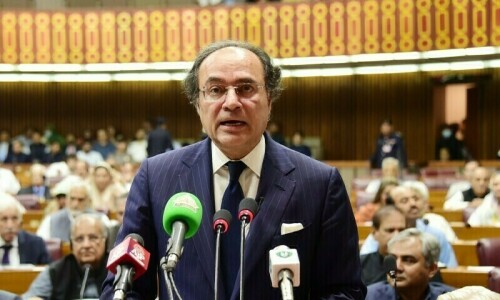
KABUL: Shortly after Friba joined the Afghan National Police, she gave herself the nickname “dragon” and vowed to bring law and order to her tormented homeland.
Five years later, she is tired of rebuffing the sexual advances of male colleagues, worries the budget for the female force will shrink and fears the government will abandon them.
Women in the police force were held up as a showcase for Afghan-Western efforts to promote rights in the new Afghanistan, born from the optimism that swept the country after the ouster of the Taliban in 2001.
Images of gun-wielding Afghan policewomen have been broadcast across the globe, even inspiring a television programme popular with young Afghan women.
But going from the burqa to the olive green uniform has not been easy.
In Reuters interviews with 12 policewomen in districts across the Afghan capital, complaints of sexual harassment, discrimination and bitter frustration were prevalent.
President Hamid Karzai’s goal is for 5,000 women to join the Afghan National Police (ANP) by the end of 2014, when most foreign troops will leave the country.
But government neglect, poor recruitment and a lack of interest on the part of authorities and the male-dominated society mean there are only 1,850 female police officers on the beat, or about 1.25 per cent of the entire force.
And it looks to get worse.
Friba, who asked that her second name not be used, says it all when she runs a manicured finger across her throat: “Once foreigners leave we won’t even be able to go to the market. We’ll be back in burqas. The Taliban are coming back and we all know it.”
Conditions for women in Afghanistan have improved significantly since the Taliban were ousted.
Women have won back basic rights in voting, education and work since Taliban rule, when they were not allowed out of their homes without a male escort and could be publicly stoned to death for adultery.
But problems persist in the deeply conservative Muslim society scarred by decades of conflict.
The United Nations said this month that despite progress, there was a dramatic under reporting of cases of violence against women.
Some female lawmakers and rights groups blame Karzai’s government for a waning interest in women’s rights as it seeks peace talks with the Taliban, accusations his administration deny.
“We have largely failed in our campaign to create a female police force,” said a senior Afghan security official who declined to be identified because of the sensitivity of the subject.
“Mullahs are against it, and the women are seen as not up to the job,” he added, referring to Muslim preachers.
Almost a third of the members of the female force work in Kabul, performing duties such as conducting security checks on women at the airport and checking biometric data.
“Constantly harassed”
Friba sat in a city police station room decorated with posters of policemen clutching weapons to talk to Reuters.
“I am the dragon and I can defend myself, but most of the girls are constantly harassed,” she said. “Just yesterday my colleague put his hands on one of the girl’s breasts. She was embarrassed and giggled while he squeezed them. Then she turned to us and burst into tears.”
On the other side of Kabul, detective Lailoma, who also asked that her family name not be used, said several policewomen under her command had been raped by their male colleagues.
Dyed russet hair poking out from her black hijab, part of the female ANP uniform, Lailoma wrung her hands as she complained about male colleagues: “They want it to be like the time of the Taliban. They tell us every day we are bad women and should not be allowed to work here.”
Male colleagues also taunt the women, she added, often preventing them from entering the kitchen, meaning they miss out on lunch.
On several occasions, male colleagues interrupted Reuters interviews in what the policewomen said were attempts to intimidate them into silence.
One male officer entered the room without knocking three times to retrieve pencils; another spent 20 minutes dusting off his hat, only to put it back on a shelf. The women switched subjects when the men came in.
Rana, a 31-year-old, heavy-set policewoman with curly hair, said policewomen were expected to perform sexual favours:
“We're expected to do them to just stay in the force.”
The raping of policewomen by their male counterparts “definitely takes place”, said Colonel Sayed Omar Saboor, deputy director for gender and human rights at the Interior Ministry, which oversees the police. “These men are largely illiterate and see the women as immoral.”
Insecurity, opposition to women working out of the home and sexism deter many women from signing up, said Saboor.
But impoverished widows sometimes have no choice. A starting salary is about 10,500 afghanis a month ($210).















































Dear visitor, the comments section is undergoing an overhaul and will return soon.